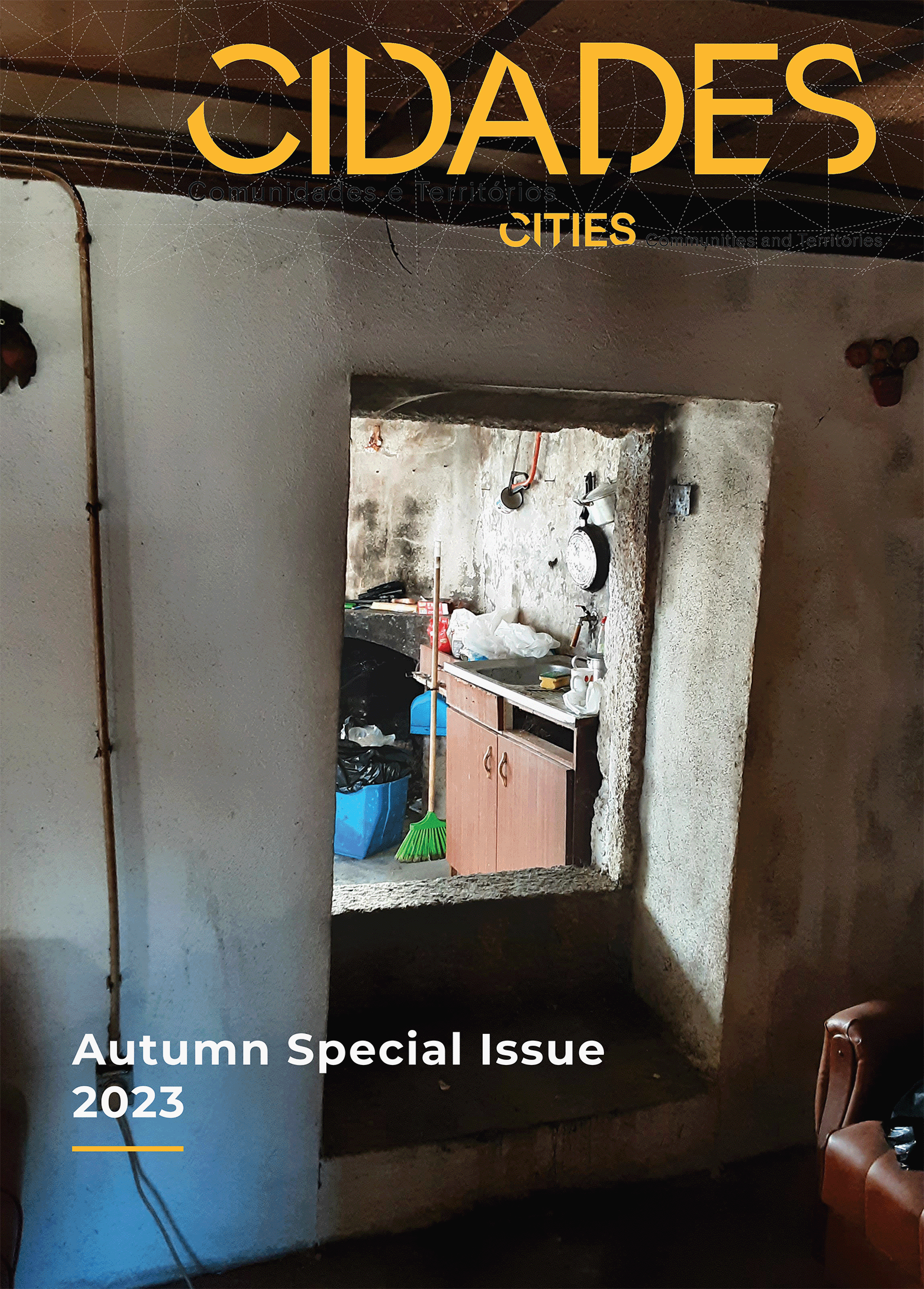Is homelessness a matter of choice?
An exploratory study held in Azores
DOI:
https://doi.org/10.15847/cct.28721Keywords:
homelessness, social and housing exclusion, Azores, free choiceAbstract
One of the critical issues in the public debate around homelessness is associated with the perception, widely held in Europe, that most people who remain homeless do so due to behavioural factors in the domain of free choice. It is argued that this fact, by imputing responsibility for the problem on the individual, constrains the debate as well social and political responses in this field. This article presents and discusses the results of an exploratory study focused on the Azores, based on the frame of participatory action research, including extensive and intensive methodologies. Firstly, we highlight some data regarding the count and socio-demographic characterization based on an online survey similar to the one adopted under the National Strategy for the Integration of People Experiencing Homelessness, referring to December 31st, 2020. Secondly, proposing a deepening of the European typology on homelessness and housing exclusion (ETHOS), we explore the meaning of being homeless based on six focus groups involving two actors whose perspective is considered relevant to understand this issue - people in this condition and professionals working with this target audience. Data were analysed considering the problem of free choice, identifying some of the crucial debates which may be conditioning societal choices. There is a growing trend in the phenomenon in which structural factors may be contributing to an increase in the number of people involved, as well as the severity of the situation faced in each of the domains discussed. It is also considered that the individualization of the problem contributes to the normalization of homelessness, and it is essential to recognize that it brings back to the spotlight the debate on collective definitions of citizenship.
References
Adorno, T. (1975 [1966]). Dialéctica negativa. Traduzido por José M. Ripalda. Madrid: Taurus Ediciones.
Aldeia, J. (2013). Investigar o fenómeno dos sem‐abrigo. Em defesa de uma política ontológica declarada e preocupada. Revista Crítica de Ciências Sociais, 97, 133–154. https://doi.org/10.4000/rccs.4964
Baptista, I., Benjaminsen, L., Busch-Geertsema, V., & Pleace, N. (2020). Staffing Homelessness Services in Europe, EOH, Comparative Studies on Homelessness, 10, Brussels: Feantsa. https://www.feantsaresearch.org/en/comparative-studies/2020/12/16/comparative-studies-onhomelessness-10-staffing-homelessness-services-in-europe?bcParent=763
Baptista, I.; & Marlier, E. (2019). Fighting homelessness and housing exclusion in Europe: A study of national policies. Directorate-General for Employment, Social Affairs and Inclusion (European Commission). https://data.europa.eu/doi/10.2767/624509
Bento, A., & Barreto, E. (2002). Sem-amor: Sem-abrigo. Lisboa: Climepsi.
Brady, D. (2019). Theories of the Causes of Poverty, Annual Review of Sociology, 45:1, 155-175. https://doi.org/10.1146/annurev-soc-073018-022550
Busch-Geertsema, V., Edgar, W., O’Sullivan, E., & Pleace, N. (2010). Homelessness and Homeless Policies in Europe: Lessons from Research. FEANTSA & European Union.
Costa, A. (2008), A Dificuldade da Escolha. Ação e Mudança Institucional. Tese de doutoramento. Lisboa: ISCTE-IUL.
Edgar, B. (2009). European Review of Statistics on Homelessness. FEANSTSA. https://www.feantsaresearch.org/download/6-20098376003316223505933.pdf
Edgar, B. (2012). The ETHOS Definition and Classification of Homelessness and Housing Exclusion. European Journal of Homelessness, Volume 6, No. 2, 219-225. https://www.feantsaresearch.org/download/ejh6_2_resp_ethosdef14957038748931638958.pdf
ENIPSSA (2022). Inquérito Caracterização das Pessoas em Situação de Sem-Abrigo - 31 de dezembro 2021. https://www.enipssa.pt/documents/10180/11876/Inqu%C3%A9rito+Caracteriza%C3%A7%C3%A3o+das+Pessoas+em+Situa%C3%A7%C3%A3o+de+Sem-Abrigo+-+31+de+dezembro+2021+-+Quadros.pdf/c8859201-04e0-4051-be4c-66736e7d9136
Fernandes, L. (2019). Ação coletiva de pessoas desempregadas. Tese de Doutoramento em Sociologia. Universidade de Coimbra. https://eg.uc.pt/handle/10316/87581
Fontes, P. (2012). Sem-abrigo: Condições intersubjetivas de reconhecimento. In Direitos Humanos e Qualidade de Vida nas Comunidades falantes do Português nos EUA e Canadá (pp. 203–211). Presidência do Governo dos Açores, MAPS – Massachusetts Alliance of Portuguese Speakers. Lesley University: Nova Gráfica.
Fontes, P. (2022). Dialética negativa e a possibilidade de um diagnóstico social: Honneth leitor de Adorno. In A atualidade da dialética negativa de Adorno. Goiânia: Editora da Universidade Federal de Goiás.
Fontes, P., Fernandes, H., & Fernandes, L. (2022a). Relatório final do Estudo À Margem. Ponta Delgada: Novo Dia. https://www.novodia.org/a-margem-trajetorias-de-vida-de-rua/
Fontes, P., Fernandes, H., & Fernandes, L. (2022b). Estudo à Margem. Relatório de caraterização sociodemográfica. Associação Novo Dia. https://4151a5c8-348c-441f-9545-a7bec6c67a9e.usrfiles.com/ugd/4151a5_9cb067b2b69a4e328145f6af9a5f7034.pdf
Fondation Abbé Pierre & FEANTSA. (2023). 8e Regard sur le mal-logement en Europe. https://www.fondation-abbe-pierre.fr/sites/default/files/2023-08/8_Regard_Europe_2023_VDEF.pdf
Honneth, A. (2009). La justicia en execución. La “Introduccíon” de Adorno a la Dialéctica negativa. In Patologias de la Razon. Historia y Actualidad de la Teoria Critica. Tradução de Griselda Mársico. Madrid: Katz.
Mayock, P., & Bretherton, J. (Eds.). (2016). Women’s Homelessness in Europe. Palgrave Macmillan UK. https://doi.org/10.1057/978-1-137-54516-9
Nobre, S. (2021). Women ́s Homelessness and Housing Exclusion in the Northern Lisbon Metropolitan Area: An In-depth Exploratory Study. Universidade Nova de Lisboa. https://run.unl.pt/bitstream/10362/123033/1/Tese%20versão%20final.pdf
Nooe, R. M., & Patterson, D. A. (2010). The Ecology of Homelessness. Journal of Human Behavior in the Social Environment, 20(2), 105–152. https://doi.org/10.1080/10911350903269757
Nussbaum, M. (2000), The Cost of Tragedy: Some Moral Limits of Cost-Benefit Analysis, Journal of Legal Studies 29: 1005-1036.
O’Brien, R. (2001). An Overview of the Methodological Approach of Action Research. In R. Richardson (Ed.), Theory and Practice of Action Research (pp. 1–18). João Pessoa: Universidade Federal da Paraíba.
Petit, J., Loubiere, S., Tinland, A., Vargas-Moniz, M., Spinnewijn, F., Manning, R., Santinello, M., Wolf, J., Bokszczanin, A., Bernad, R., Kallmen, H., Ornelas, J., Auquier, P., & HOME-EU consortium study group. (2019). European public perceptions of homelessness: A knowledge, attitudes and practices survey. PLOS ONE, 14(9), e0221896. https://doi.org/10.1371/journal.pone.0221896
Piven, Frances F. (1998). Welfare and Work. Social Justice, 25(1), 67–81.
Provedoria de Justiça. (2021). Os Sem-abrigo em Tempos de Emergência. https://www.provedor-jus.pt/documentos/sem_abrigo_cadernos_da_pandemia_2021_web.pdf
Rabiee, F. (2004). Focus-group interview and data analysis. Proceedings of the Nutrition Society, 63(4), 655–660. https://doi.org/10.1079/PNS2004399
Scott, John (1994). Poverty and wealth: citizenship, deprivation and privilege. New York: Longman.
Shinn, M. (2010). Homelessness, Poverty and Social Exclusion in the United States and Europe. European Journal of Homelessness, 4, 19–44. https://www.feantsaresearch.org/download/article-1-23498373030877943020.pdf
Smithson, J. (2000). Using and analysing focus groups: Limitations and possibilities. International Journal of Social Research Methodology, 3(2), 103–119. https://doi.org/10.1080/136455700405172
Vice-Presidência do Governo Regional (2022). Rendimento Social de Inserção – Relatório Anual 2021, Núcleo de Planeamento, Estatística e Documentação (NPED). https://portal.azores.gov.pt/documents/2313810/6818301/RSI+-+Relat%C3%B3rio+Anual+2021.pdf/22ee34c3-dbd9-655f-7fcb-fb1e0924c36a?t=1652178210152A
Downloads
Published
Issue
Section
License
Copyright (c) 2023 Lídia Fernandes, Paulo Fontes, Ana Costa, Joana Lages, Hélder Fernandes

This work is licensed under a Creative Commons Attribution-NonCommercial-NoDerivatives 4.0 International License.
CIDADES, Comunidades e Territórios by DINÂMIA'CET-Iscte is licensed under a CC-BY licence.






